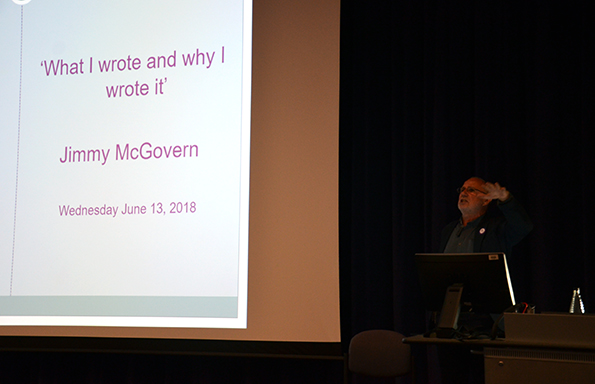Jimmy McGovern: "My country must make itself worthy of my instinctive love"
Published on

Award-winning writer and legendary scouser, Jimmy McGovern took to the stage to deliver the final talk in the University of Liverpool’s Eleanor Rathbone Social Justice Public Lecture Series.
Speaking to a packed audience in the University’s Eleanor Rathbone Lecture Theatre, Jimmy McGovern opened with a discussion of Hillsborough, and perceptions of football fans at that time.
He later went on to write his famous Hillsborough drama documentary, but before getting to that, he touched upon his success with the first series of Cracker in 1993.
With the show pulling in 14million viewers, Jimmy said he was given ‘carte blanche’ for the second series, and decided he wanted to bring the Hillsborough story in.
He created the character of Albie Kinsella as a normal person so deeply affected by Hillsborough that he goes on to behave in a way befitting the stereotypical portrayal of football fans, and this caused “some uproar on the left”.
But Jimmy said: “If I had my life over again, I would still write that” adding that his only regret was “not getting a scouser for the role”, despite his best efforts.
Fresh from his Cracker success, Jimmy said he was approached by Hillsborough families to create a drama-documentary. His initial response was to feel “honoured”, but he then realised he “didn’t have a clue how to write it”.
He decided to interview the families and collect stories, “I didn’t know what I had let myself in for, it was interview after interview of the most gut-wrenching stuff”, he said.
With a huge draft complete, and after conversations with lawyers, he realised he was going to have to focus on only a few stories that seemed representative, and could be delivered with “simplicity and clarity”.
This created more angst, as “the final insult is anonymity” – to be one of the 96, and not named.
Once complete, the film was shown to the Hillsborough families, and they were “devastated, incapable of speaking” such was the power of the emotion evoked.
Jimmy said: “I took the film to London for the press screening and it was the biggest I’ve ever been at. I knew from that day what documentary really does – it changes the agenda.
“Up until that point, every time the Hillsborough families were called upon to talk about Hillsborough, it was to answer criticism.
“But when the film was shown, the agenda became that which was set by the film; and that was police incompetence.”
The former teacher then discussed his work, Dockers and the challenge of writing the ‘scab’ character – the former dockers he interviewed had refused to do so.
Then came the commission for Sunday, about the Bloody Sunday massacre in Northern Ireland, and the “weirdest interview” with Martin McGuinness.
Jimmy said he was driven to open moorland with the late Sinn Fein leader: “He sat me on a rock, stood over me and said, ‘what do you need to know?’”
But it was through the process of collecting information and writing Sunday, that Jimmy says he realised he was “a patriot”.
He said: “It was then I realised I was a patriot.
“I love my country but not because it’s full of old Etonians and hypocrites but because everything I love is here; my family, friends, Calderstones Park, my football team.
“Everything I love is in this country, I can’t help but love it, therefore that love is instinctive.
“Those words of John F Kennedy’s are wrong. We should ask, how is it my country can prove itself worthy of my instinctive love?
“And it doesn’t prove itself worthy by making families wait for justice, or sending soldiers on to the streets to murder people on their own front doorstep.
“When that happens the true patriot stands up to be counted; and lambasts his country and shouts and screams and marches and protests, and long may we continue to do so.”
The talk was organised by Professor Barry Goldson, he said: “The Department of Sociology, Social Policy and Criminology has been hosting the Eleanor Rathbone Social Justice Public Lectures for many years.
“The lecture series reflects the core mission and commitment to social justice that characterises our research, teaching, public engagement and impact.
“A similar commitment courses through the veins of Jimmy McGovern’s work and we were delighted when he accepted our invitation to present the latest lecture in the series.
“Jimmy’s lecture was exceptionally well attended and it was presented with the passion and integrity that typifies his exceptional contribution to the wider social justice project.”